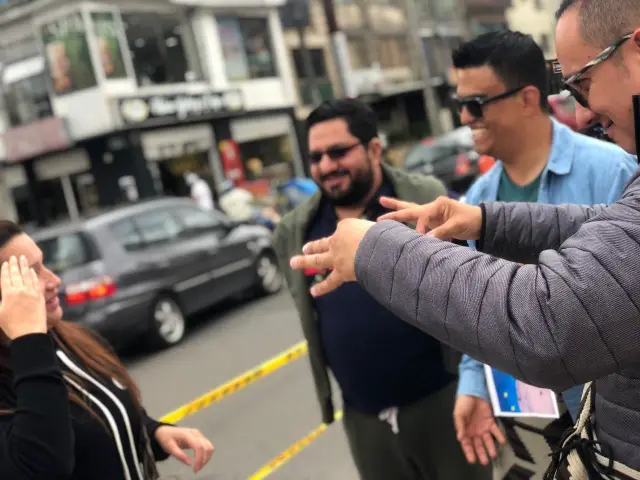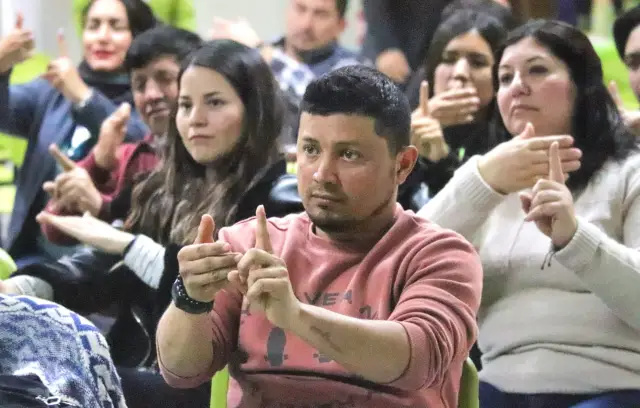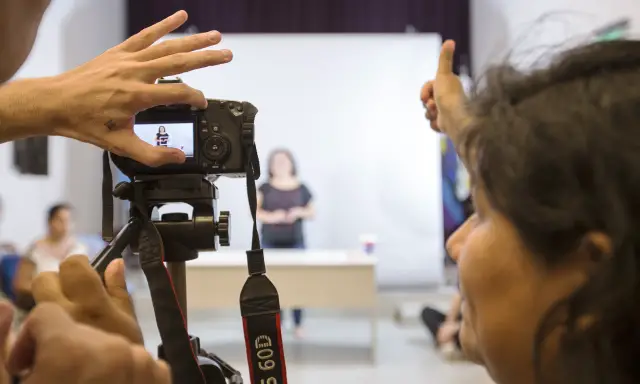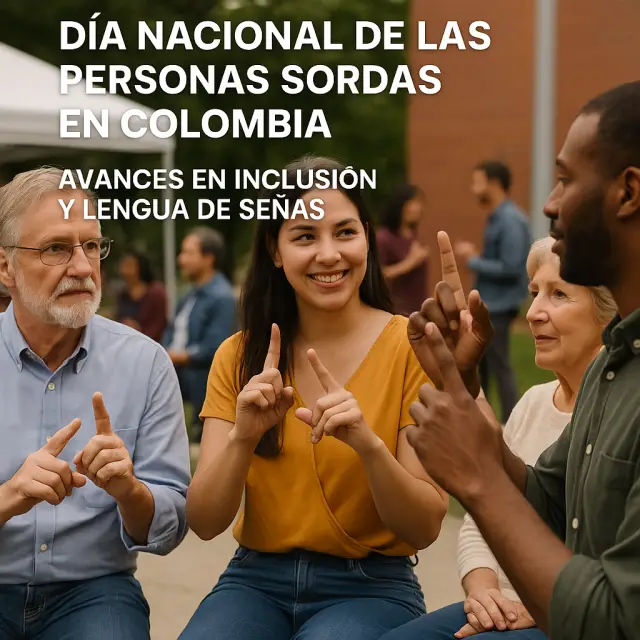Every June 28th, Colombia commemorates National Deaf Day , a day dedicated to celebrating the achievements, highlighting the struggles, and vindicating the rights of this community. This date was chosen in honor of the founding, in 1860, of the first educational center for deaf people in the country, marking the beginning of institutional recognition of their needs and potential.
In a multicultural and diverse country like Colombia, this day represents an opportunity to reflect on the challenges faced by deaf people and renew the commitment to equity. It also highlights the value of Colombian Sign Language (CSL) as a fundamental expression of identity, culture, and access to information. In recent years, significant progress has been made in legislation, education, and social awareness, but there is still a long way to go to achieve true inclusion.

Advances in the inclusion of deaf people in Colombia
Legal recognition and rights
Colombia has taken important steps toward a more inclusive society through its legal framework. Law 324 of 1996 was a pioneer in establishing standards to guarantee accessibility to communication, eliminating barriers that historically marginalized the deaf population. Subsequently, Law 982 of 2005 officially recognized LSC as the community's own language, marking a milestone in the development of inclusive language policies.
These advances were consolidated by Law 1618 of 2013 , which establishes measures to ensure the full exercise of the rights of persons with disabilities, including the obligation of public and private entities to guarantee reasonable accommodations in education, justice, health, and employment. This legislation promotes equal opportunities, autonomy, and the active participation of deaf people in all spheres of life.
Main regulations:
Law 324 of 1996: Promotes the elimination of communication barriers and encourages the use of technical aids.
Law 982 of 2005: Recognizes LSC as the official language of the deaf community and promotes its teaching.
Law 1618 of 2013: Establishes conditions of accessibility and social inclusion in all sectors of the State.
Bilingual bicultural education
One of the most important achievements has been the promotion of a bilingual-bicultural educational model. This approach recognizes that deaf people have the right to an education that respects their native language, Spanish, and to the teaching of Spanish as a second language. This model strengthens reading comprehension, critical thinking, and civic participation.
The model also promotes respect for Deaf culture, allowing deaf students to develop in an environment that recognizes their linguistic and cognitive characteristics. Thanks to the work of INSOR and other educational institutions, more and more institutions are incorporating interpreters, adapted content, and trained teachers to provide more equitable and effective education.
Pioneering institutions:
National Institute for the Deaf (INSOR)
Public schools with specialized inclusion classrooms
Universities with training programs in interpretation and pedagogy in LSC

Colombian Sign Language: Pillar of deaf identity
What is the LSC?
Colombian Sign Language (CSL) is a visual and gestural language, with its own grammatical structure, used by thousands of deaf people in Colombia. It is not a translation of Spanish, but a natural language with unique rules, syntax, and vocabulary. Its recognition in 2005 was an act of linguistic and cultural justice that positioned the deaf community as an active part of national diversity.
This language allows deaf people to fully express themselves, build a collective identity, and access fundamental rights such as education, information, and justice. Furthermore, it has been key in the development of community support networks, where language not only communicates, but also unites, educates, and empowers.
Cultural and educational importance
LSC is much more than a communication tool: it is an essential component of Colombian deaf culture. Its use in educational settings has significantly improved learning processes, reducing school dropout rates and facilitating the integration of deaf students into higher education.
The LSC's recognition has encouraged the creation of educational materials, accessible television programs, and cultural projects such as theater, poetry, and visual narratives that reflect the experiences and expressions of this community. This strengthens their collective identity and sense of belonging.
Training of interpreters
The growing demand for interpreters has led to the creation of technical and vocational training programs. Currently, universities and training centers in several regions of the country offer accredited programs, raising the bar for quality interpretation in educational, legal, medical, and social settings.
Having professional interpreters ensures that deaf people can actively participate in public life, access essential services, and exercise their rights on an equal footing.
Current challenges for the deaf community
Despite regulatory and social advances, the deaf community in Colombia continues to face significant barriers. Many deaf people still lack access to healthcare services with interpreters, which affects their well-being and safety. Similarly, in rural and remote areas, bilingual education is scarce or nonexistent, limiting development opportunities.
In the media, the presence of interpreters is still limited and often relegated to secondary roles. Furthermore, unemployment rates among deaf people are high due to a lack of employment inclusion policies and employers' lack of knowledge about how to adapt work environments.
Overcoming these challenges requires not only political will, but also civic education, investment in inclusive infrastructure, and strengthening partnerships between the state, the private sector, and civil society.

Outstanding initiatives in favor of inclusion
Accessible technology
Technology has been a key ally in the inclusion of the deaf community. Currently, there are mobile apps that translate phrases from Spanish into LSC, facilitating real-time communication. Likewise, virtual educational platforms are developing audiovisual content with sign language interpreters, subtitles, and animations.
Colombian companies have begun developing inclusive virtual assistants and adapting websites to be navigable through visual content. These tools not only promote the autonomy of deaf people but also transform the way they interact with the digital world.
Media with interpreters
Some television channels have made progress in incorporating interpreters on newscasts and information programs. Although still limited, channels such as Señal Colombia and Canal Institucional have pioneered this practice, sending a clear message that accessible communication is a right, not a favor.
Awareness campaigns
Organizations like FENASCOL , along with government and educational entities, promote campaigns to eliminate stereotypes and foster inclusion. These campaigns include cultural events, fairs, sign language workshops, and seminars on human rights.
How to commemorate June 28th?
Participate in commemorative events organized by educational institutions, NGOs, and deaf groups.
Share messages of inclusion on social media, using hashtags like #DeafPeoplesDay or #InclusiveColombia.
Learn basic words in LSC, such as greetings, numbers, and polite phrases.
Invite your company or institution to organize awareness workshops or sign language training.

Benefits of an inclusive society
When a society embraces true inclusion, everyone benefits. Communicative diversity enriches human relationships, fosters creativity, and promotes more empathetic coexistence. Furthermore, by eliminating barriers, it creates employment, academic, and cultural opportunities that benefit both people with disabilities and the country's economy and social fabric.
Frequently Asked Questions (FAQ)
Why is National Deaf Day celebrated on June 28?
Because on this date, in 1860, the first official school for deaf people in Colombia was founded, marking a starting point in the recognition of their educational rights.
What does it mean for the LSC to be officially recognized?
This means that it has legal status as a legitimate language, which means it must be protected, promoted, and used in official settings, especially in education and public services.
Where can I learn Colombian Sign Language?
You can learn at institutions such as INSOR , FENASCOL , public and private universities, as well as on online platforms that offer free, certified courses.
What can I do to support the inclusion of deaf people?
From simple actions like learning LSC to promoting inclusive policies in your school or workplace, you can also support campaigns and demand that media outlets include interpreters.
Does the deaf community have its own culture?
Yes. This culture includes traditions, forms of artistic expression, social customs, and shared values that revolve around the visual experience and the use of sign language.
A call to action for equity and barrier-free communication
National Deaf Day in Colombia is much more than a symbolic date: it is a platform to highlight, value, and empower a community that has historically fought for its rights. Through inclusive policies, accessible technologies, and an engaged citizenry, it is possible to build a Colombia where difference is not a reason for exclusion, but an opportunity to enrich the social fabric. This June 28th, let us join the change through our daily actions and commit to a truly inclusive society.
